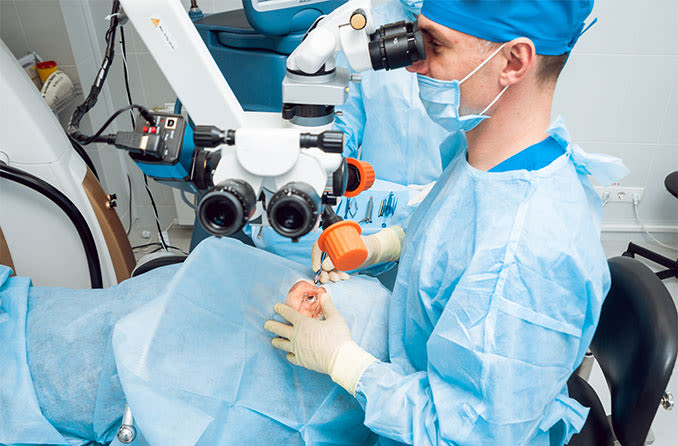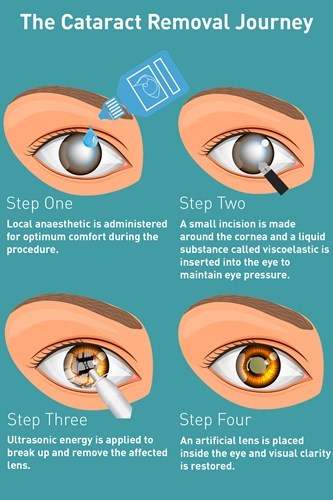
Is there a cure for cataracts? The answer is yes, but it isn't easy. If you have a cataract, you know how much it can affect your life. But, if you don't, well, there's no reason to worry. Cataracts happen because your vision gets bad, not because you have them.
Cataract is a form of vision disorder that occurs when your lens thins and drips the inside of your eyes with fluid
This messy fluid is also trapped in the tears and drains into your eyes, which makes it worse for your vision and causes it to gradually cloud up. Cataract is very common among those who get older.
There is no cure for cataract, but there are ways to prevent it from happening and keep it under control. You should be careful not to smoke, drink alcohol or use certain drugs because they can make your eyes more sensitive to light. You should also try to use protection while outdoors. It's also good to keep your glasses on all the time, unless you really have to wear them.
Some people don't want to wear prescription lenses anymore, because they can make their eyes feel achy and uncomfortable, plus they are uncomfortable to wear at night or while driving. But prescription lenses have their limitations – for one thing, they cannot correct nearsightedness or farsightedness, but only nearsightedness.
Another option is cataract surgery, but this will have to wait until the cataract has reached the point where surgery will not help. The sooner it gets better, the better.
Laser surgery is another option for people who have already had cataract surgery, but have had to repeat the surgery because the cataract is still not responding well. It has many benefits and will allow you to have a clearer vision in a shorter period of time than in the past.
Ophthalmologists can tell you if you need surgery for cataract by looking at your eyes and asking questions. They will take a look at your iris and determine if there are any deposits of fluid blocking the tear ducts, and if you see any signs of infection, like cloudy vision or gritty vision, in the middle of the eye.
After determining that cataract surgery is necessary, the ophthalmologist will discuss with you how to prevent your eyes from getting cataract. He or she will likely give you a prescription for an anti-inflammatory medicine to treat any inflammation you may have. And then he or she will give you glasses and/or contact lenses, depending on the degree of obstruction caused by the cataract.
Sometimes people find that cataract surgery and laser surgery are just not enough, so they end up with cataract surgeries in addition to what the ophthalmologists prescribed. For example, some people need to remove both the cataract and the lens so they can see clearly.

If you're considering this treatment, talk to your ophthalmologist to see if you'll need to have vision tests before, during and after the surgery. Your ophthalmologist will be able to determine if you are at a higher risk of complications if the cataract is not treated early enough to prevent damage to the eye.
If you have any concerns, visit your doctor right away. But if you wait for too long, the cataract can form a scar, so you'll have to get surgery to remove the old one and then replace it with the new one – which will leave a larger opening for fluid and other things to enter the eye.
The cataract surgery itself is relatively painless. It is usually performed under general anesthesia and will last about two hours, but you may want to take it easy during the recovery period.
Surgeons have a lot of experience when it comes to this procedure, and it shouldn't be hard to recover in a week or so. But don't go to bed for at least two days, as the surgery is not something you can do overnight.
Deep vein thrombosis, or DVT, is the accumulation of blood clots in the veins in the legs. It causes excruciating pain, swelling and a general feeling of discomfort. It can happen anytime, but it is most common in older adults. People with a family history of DVT may be at a higher risk for developing it. Also, people who are overweight or obese are at greater risk for getting DVT.
Deep vein thrombosis can also happen due to injuries caused by sports like soccer, tennis, etc. Injuries can lead to other types of DVTs. It can also occur due to the use of illegal drugs. Smoking is one of the reasons why most people develop DVT. Even if you are not an active smoker, there is still some risk of contracting DVT. People who do not get enough sleep or those who have high blood pressure are also prone to DVT.
There are several things that can contribute to DVT. Smoking and alcohol are common factors that contribute to DVT. If you smoke, you have to stop this habit as it is the most important factor that leads to DVT. Excess weight and obesity increase your chances of developing DVT. Alcohol is also another factor that increases the risk of developing DVT. If you smoke, it is important to quit and make your life healthy. This will not only help you avoid developing DVT but also give you good health.
There are some lifestyle changes that can be made in order to reduce your risk of developing DVT
You can try to avoid standing for long periods of time. If you are a smoker, you need to stop this habit. Smoking will increase your risk of developing DVT. The best way to lose weight is to go on a diet and follow a low-calorie diet. Smoking also doubles your risk of developing DVT. Eating foods that are rich in calcium is a good way to prevent this disease.
Another preventive measure that can reduce your chances of developing deep vein thrombosis is to take Vitamin C supplements. This vitamin is essential for the protection of blood clotting, especially if you have a history of clotting. It helps prevent DVT because it helps in blocking the formation of platelet crystals.
Prevention is always better than cure and deep vein thrombosis is no exception. However, if you are already suffering from DVT, you can take the preventive measures mentioned above. and if these don't work, then you should consult a doctor and start treatment immediately. You can use a blood thinning agent if your DVT is not too severe.


